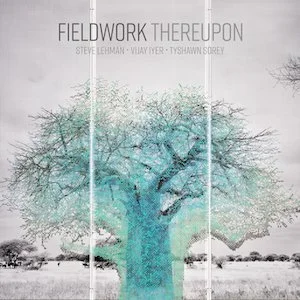Label: Endectomorph Music, 2025
Personnel - Yuhan Su: vibraphone; Anna Webber; tenor saxophone, flute; Alex LoRe: alto saxophone, flute; Matt Mitchell: piano; Yingda Chen: guitar; Marty Kenney: bass; James Paul Nadien: drums; Shinya Lin: electronics.
New York–based Taiwanese vibraphonist and composer Yuhan Su fronts a superb octet of outstanding musicians and improvisers on her new outing, OVER the MOONs, a collection of eight original compositions that probe the boundless potential of collective and individual creativity. Bristling with virtuosity yet marked by graceful elegance, the album finds Su expanding her sonic palette through effect pedals, modernizing the vibraphone’s voice and channeling a style of jazz—angular melodies, kaleidoscopic harmonies, and free improvisation at its core—that feels fully alive and thriving.
“Pieces Piece” throws the instruments into a puzzling collage of fragments and motifs, a droning, dancing swirl that is both playful and acutely constructed. The swift, tightly coordinated vibraphone-and-keyboard runs land squarely on the chest, propelled by the energizing rhythmic engine of Marty Kenny’s bass and James Paul Nadine’s drums. Pianist Matt Mitchell unleashes a torrent of ideas in an expansive solo, followed by tenor saxophonist Anna Webber, who darts in and out of a more rock-tinged foundation. “Tomorrow”, with its gradually accelerating theme and featuring superb electronic work by Shinya Lin, explores avant-garde terrain with agile rhythmic mutations. Webber soloes fearlessly, opening the door to a collective exploration with protuberant guitar adornments by Yingda Chen in the background, and Su’s impulsively chromatic vibes driving the flow.
Tension is part of the appeal here, but so is mystery. “Two Moons” materializes as a recondite chimera, its delay-coated vibraphone intro softened by flutes from Webber and Alex LoRe, along with Chen’s ethereal guitar tendrils. Contemplative yet exploratory, the piece reflects Su’s lived navigation between cultures and languages. The ecstatic, distorted vibraphone effects on “Roaring Houses” evoke Wyoming’s powerful winter storms—conditions she experienced while writing much of the album during a 2024 residency. The rhythm section shines in punchy, knotty counterpoint, while the soloists—Mitchell, Chen, and Su—steer through meter shifts and rhythmic entanglements with precision and verve.
Playful and staccato-driven, “Genius and Dumb” incorporates Su’s Mandarin words processed electronically, producing a groovy machine-like energy enhanced by sharp digital manipulation and a vibrant tenor solo bursting with color and possibility. The album closes quietly with “Too Much Time Marching Clouds”, an impressionistic, near-edenic reverie featuring haunting guitar textures and absorbing saxophone exchanges.
Whether whispering or erupting, Su’s music remains consistently engrossing. She stands here as a truly inspired artist with a bright future ahead.
Favorite Tracks:
01 - Pieces Piece ► 02 - Tomorrow ► 04 - Roaring Houses ► 06 - Genius and Dumb












